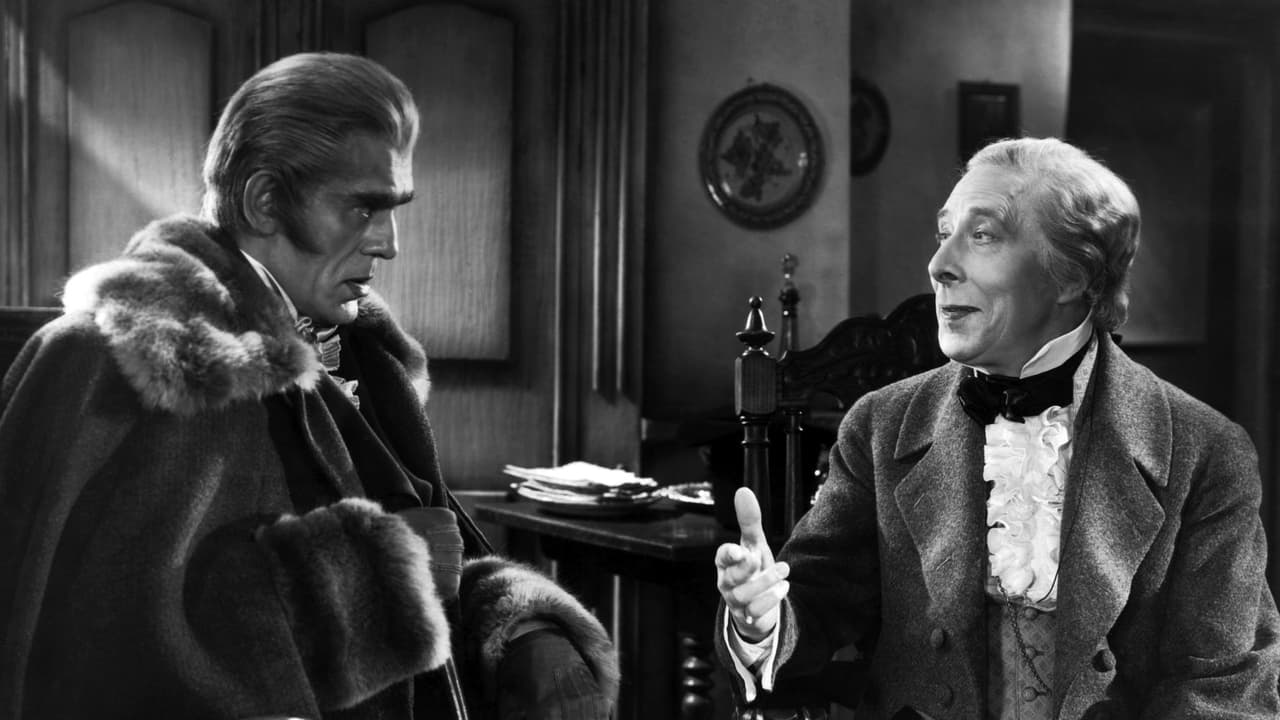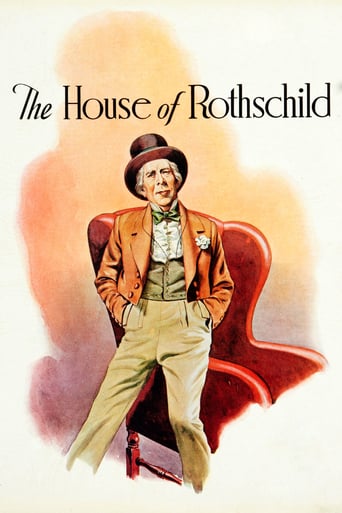

Exceptional movie starring George Arliss as the head of the Rothschilds, a Jewish family of bankers who deal with anti-Semitism in 19th century Europe. Fascinating from a historical perspective as well as entertaining. It certainly stands out for the time period. I think the word Jew was used more in this movie than in all other Golden Age Hollywood movies I've seen combined. George Arliss is terrific. Loretta Young plays his daughter. She looks very pretty and while this is hardly one of her top performances, she holds her own against veteran actors well. Boris Karloff is the villain and does a fine job. The rest of the cast includes Robert Young, C. Aubrey Smith, William Mowbray, Reginald Owen, and Arthur Byron, among others. The script is smart and the story is enjoyable on its own as well as when viewed as a commentary on the goings-on in Germany at the time. Final scene is shot in early Technicolor. One of the most exciting movies about banking ever made. Okay, it's about more than that, but the point still stands.
... View MoreThis would never have made it past the producers, the Breen Office, or the German representatives in Hollywood a year or two later. It opens with what appears to be an outlandish parody of Jewish life in 1780s Prussia. The father (Arliss) is a money lender or pawn broker or something, overacting to beat the band. He and his family run around their humble household when they see the tax collector coming. Arliss wrings his hands and in a quivering voice orders the rest to hide the silverware and the roast, and to break out the second set of books. The sneering tax collector is amenable to a bribe, and when he leaves, the family cackled over how they outwitted him and saved money on the deal. It sets the stereotype in cement -- greedy, money-mongering, clannish cheaters.It develops that there were reasons enough for the family's worry. The Jews of Frankfort all live in "Jew Street" and are taxed at a far higher rate than the mayor himself. The government is corrupt and openly anti-Semitic. But all that has little impact on the unwittingly comic scene of the poor Rothschild's noisily dashing about and trying to hoodwink the tax collector. The old man dies at the end, advising his sons to go out into the world and establish a vast banking empire because "money is the only power we have." The four or five sons follow his orders and we skip to the Napoleonic period an focus on Nathan Rothschild (Arliss, again). The family is fabulously rich and it becomes even more so by betting against Napoleon in both wars. Despite the anti-Semitic feelings among the Allied leaders, Nathan bets everything he has and manages to save all of Europe from extinction.They've done what they could with the story but banking is essentially a boring business, I guess. I certainly have no interest in it and there were some arguments about points being up or down that left me in the dust. There is a sub-theme done with quiet subtlety. Nathan's daughter, Loretta Young, wants to marry a Captain of the Guards, Robert Young, a Gentile. And Nathan is faced with the same problem as Tevyev in "Fiddler on the Roof," the best line of which came from a young Russian who asks one of Tevyev's daughters, "Do you feel about me the way that they feel about you?" When Benny develops a warm feeling for a shiksa in "The Benny Goodman Story", Goodman's mother phrases the issue in terms of social class: "Bagels and caviar don't mix." The underlying questions have to do with the group loyalty of minority groups who have been victimized and the social borders they themselves create, but that's another story.There has always been intolerance, here and in Europe. Minorities are often discriminated against. But my understanding is that the Jews of Germany and elsewhere, like the Rothschilds were doing a pretty good job of being assimilated -- poets, doctors, bankers, scientists -- until the changing times brought disaster. By contrast, the Jews of Eastern Europe held niche occupations in smaller cities and towns. My immigrant German grandfather lived in one of those villages and I once asked him about the Jews when he was growing up. Of course there were Jews. They were money lenders. Why were the Jews the money lenders? "They ver dzha only pipple in dzha village you could trust." He was entirely serious.Didn't the Rothschilds make fine wine too? I'd like to learn more about that. Wine is more interesting than banking.
... View More(Slight Spoilers) Lavish historical epic of the Rothschild family's rise from the Jewish ghetto of Frankfurt in Prussia to become the most powerful banking institution in Europe. Thoward the end of the movie "House of Rothschild" things weren't at all looking good for the family of banking brothers with all of them, and their banks securities, buying up British bonds on the London Stock Exchange for cut-rate prices with rumors going around that the Battle of Waterloo in Belgium was lost to Napoleon's forces. It was the old stock market saying that "information is the most valuable commodity" that rescued the Rothschild's vast money holdings. That commodity in the end not only saved the Rothschild fortune, and more then doubled it, but also saved those investors who were wise enough to follow Nathans lead in not abandoning the allies financially at their most critical time of need when everything looked as if it were lost.The film mostly concentrates on how the Rothschilds, namely Nathan and his brothers, despite the anti-Jewish prejudices that they faced in early 19th Century Europe prevailed in the end to overcome the slings and arrows as well as the anti-Semitic riots incited by the likes of Prussian Count Ledrantz, Boris Karloff, to become the richest and most powerful bankers in the world.Besides the historical facts in the movie there's also a fictitious sub-plot involving Nathan's daughter Julie, Loretta Young, having a love affair with the handsome and dashing British calvary officer Captain Frizroy, Robert Young,that her father had a hard time accepting Since Fitzroy wasn't Jewish or a Rothschild. But in the end everything was ironed out, by the script writers, to make the affair between the two lovebirds a joyous and successful one.Nathan who was earlier sandbagged by Count Ledrantz and his fellow bankers when a loan that he expected his bank to float involving the restoration of France, after Napoleon's exile on the Island of Elba, was rejected. This came about because of what Ledrantz smugly called a "technicallity"! The unforgivable "technicallity" being that Nathan was Jewish! This sleazy and despicable act on the part of Ledrantz & Co. had an outrage and indignant Nathan get back at Ledrantz and his gang of banker cut-throats. Nathan thus, using financial guerrilla-like tactics, undercut the bonds that they were to float and sell to the British public representing the French loan. In the end this forced Ledrantz & Co. to come to the Rothschild Bank hat in hand begging for Nathan to become a partner. Even if Nathans partnership cost these rascals and unscrupulous financial manipulators as much as 50 million British pounds for them to do it.Smarting from the beating his and his cohorts took at the hands of the witty and clever Nathan sore loser Ledrantz started to foment anti-Jewish riots all over his native Prussia, which included the Rothschild family home "The Red Shield" in the Jewish ghetto of Frankfurt. This was Ledrantz way to get back at Nathan but that quickly came to an end with the startling news of Napoleon escaping from his exile in Elba and regaining power in France. This meant that they, Ledrantz & Co, would need the Rothschild money again to finally stop Napoleons determined attempt to conquer all of Europe. Like the bankers did before in needing the Rothschild's banks money to defeat Napoleon after his massive June 21,1812 eastern invasion that lead to his disastrous withdrawal from Czarist Russia back in the winter 1812-1813. With news hard to come by back then it was Nathan's ingenious and secret way of using carrier pigeons from the battlefield that gave him the edge in knowing that the Duke of Wellingtons, C. Aubrey Smith, forces checked and repulsed Napoleon's big offensive at the battle of Waterloo! That happened as rumors were abound on the floor of the London Stock Exchang that just the opposite happened. This timely information had Nathan and his brothers buy up all the British Government Securities that were being sold off and bid down by panicked stock brokers and investors. In the end Nathan not only saved the London Exchange from total collapse but made himself and the Rothschild Bank, or banks, the financial powerhouse that it became and is, after some 200 years later, even now.George Ariss plays both the elder Mayer and his son Nathan Rothschild in the movie with both Robert and Loretta, no relations, Young as the star-struck lovers Fitzroy and Julie in small but very important supporting roles in the film.
... View MoreIn the person of Nathan Rothschild, overlord of the international banking house that shaped the destiny of Europe, George Arliss has found his most congenial role since Disraeli. The story provides a fasinating study of internatinal intrigue in the nineteenth century. It is presented straight-forwardly, without apology or sentimentality. Because of its lack of dramatic sequence, the picture lapses into passages that become monotonous. The injection of a romantic episode between Nathan's daughter and a Gentile British office, with its mixed-marriage problem during those years, is tritely handled. This film is rarely shown over the years in America and is controversal at times. On the whole, the picture has been skillfully cast, and there are good performances by George Arliss, Reginald Owen and Boris Karloff who gives an excellent performance as Baron Ledrantz.
... View More